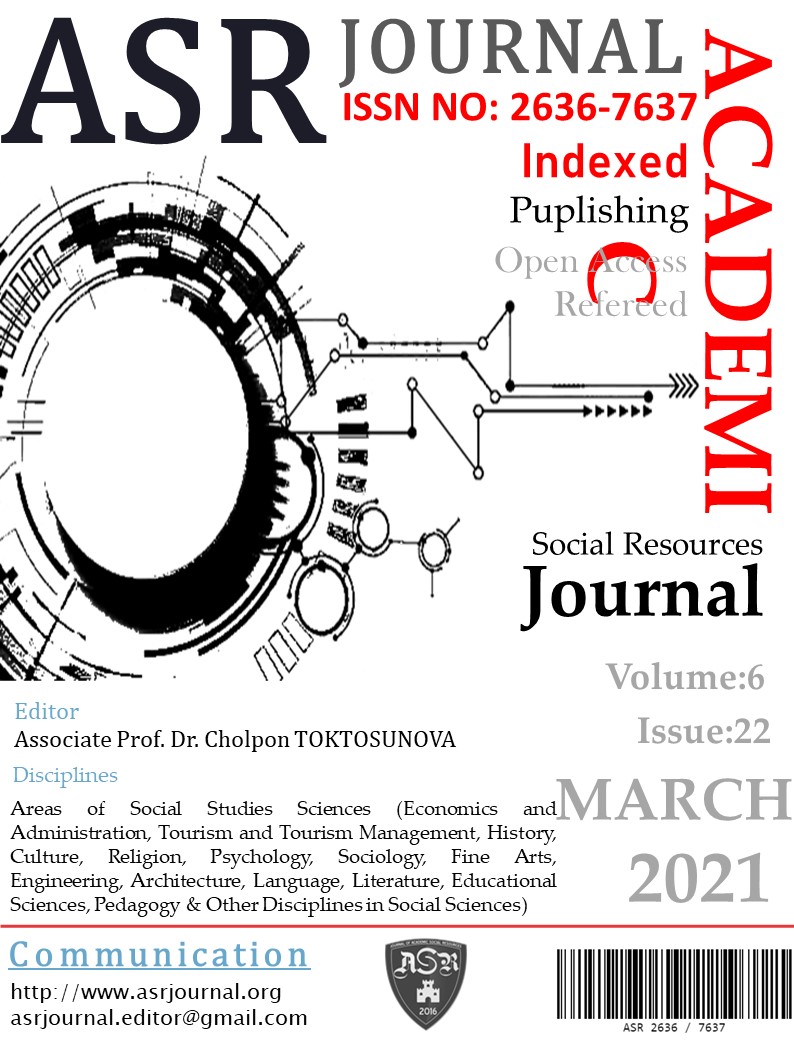Author :
Abstract
Bu araştırmanın amacı, eğitim örgütleri olan okullarda sinizm olgusunun nedenleri ve sinizmin üstesinden gelinmesi için olası çözüm yollarını ortaya koymaktır. Araştırmanın çalışma grubu 2019-2020 eğitim öğretim yılında Amasya ilinde görev yapan 7 öğretmenden oluşmaktadır. Araştırmada veri toplama aracı olarak yarı yapılandırılmış görüşme formu kullanılmıştır. Araştırma, nitel araştırma yaklaşımı çerçevesinde olgu bilim deseni kullanılarak gerçekleştirilmiştir. Öğretmenlerin sinizm tanımına yönelik algıları; travmatik sonuçlar, mesleki çöküntü, yıldırmak, sindirmek, gelişimin engellenmesi, ümitsizlik, karamsarlık, hayata küsme, içe kapanma, olumsuz düşünceler ve tutumlar olarak nitelendirmişlerdir. Katılımcıların, sinizm nedenlerine yönelik düşünceleri; ideolojik bakış açıları, veli, öğrenci, yönetici tavrı, kıskançlık, düzensizlik, kişisel çıkarlar ve adaletsizlik şeklinde sıralanmıştır. Katılımcılar ayrıca, sinizmin en çok karşılaşıldığı yerlerin kurumlar ve yöneticiler olduğunu, saygı, iletişim, iş bilinci ve sorumlulukların önem kazanması gerektiği ile birlikte liyakat ve adaletin hiçbir zaman arka planda bırakılmaması gerektiğini vurgulamışlardır. Son olarak katılımcılar, sinizmi engellemeye yönelik bilincin yöneticiler ile başlayıp en üst kademeden en alt kademeye kadar toplumun her kesime ilerleyebileceğini söylemişlerdir.
Keywords
Abstract
The aim of this study is to reveal the causes of cynicism in schools, which are educational organizations, and possible solutions to overcome cynicism. The study group of the research consists of 7 teachers working in Amasya in the 2019-2020 academic year. Semi-structured interview form was used as data collection tool in the study. The research was carried out using phenomenology design within the framework of qualitative research approach. Teachers' perceptions of the definition of cynicism; traumatic consequences, professional breakdown, intimidation, inhibition of development, hopelessness, pessimism, embitterment, introversion, negative thoughts and attitudes. Participants' thoughts on the causes of cynicism; ideological perspectives, parent, student, executive attitude, jealousy, disorder, self-interest and injustice. Participants also emphasized that institutions and administrators are the places where cynicism is encountered most, and that respect, communication, business awareness and responsibilities should gain importance, and that merit and justice should never be left behind. Finally, the participants stated that the consciousness of preventing cynicism can start with the managers and progress to all segments of the society from the highest level to the lowest level.
Keywords
- Ada, Ş. & Yarım, M. (2017). İlkokullarda Görev Yapan Öğretmenlerin Örgütsel Sinizm Algıları: Erzurum İli
- Ada, Ş. & Yarım, M. (2017). İlkokullarda Görev Yapan Öğretmenlerin Örgütsel Sinizm Algıları: Erzurum İli Örneği. Iğdır Üniversitesi Sosyal Bilimler Dergisi, 13, 66-98
- Akdemir, B , Kırmızıgül, B , Zengin, Y . (2016). Örgütsel Sinizm ile İş Performansı Arasındaki İlişki ve BirAraştırma. Kahramanmaraş Sütçü İmam Üniversitesi İktisadi ve İdari Bilimler Fakültesi Dergisi , 6 (2) , 115-130.
- Altınöz, M , Çakıroğlu, D , Çöp, S , Kahraman, E . (2017). Örgütsel Sessizliğin Örgütsel Sinizm Üzerine Etkisi: Bir Alan Araştırması. Ejovoc (Electronic Journal of Vocational Colleges) , 7 (2) , 73-79
- Andersson, L. (1996). Employee cynicsm: An Examination Using a Contract Violation Framework. Human Relations, 49, 1395-1418.
- Bilgiç, H. (2017) Liderlik İle Örgütsel Sinizm İlişkisi. Akdeniz Üniversitesi Sosyal Bilimler Dergisi 1(2), 90- 98.
- Brown, M. & Cregan, C. (2008). Organizational Change Cynicism: The Role of Employee İnvolvement, Human Resource Management, 47(4) 667-686
- Büyüköztürk Ş. (2018) Bilimsel Araştırma Yöntemleri. Pegem Akademi Yayıncılık,Ankara
- Çetinkaya, F. (2014). Hizmet İşletmelerinde Psikolojik Sözleşme İhlalleri ve Örgütsel Sinizm İlişkisi:Kapadokya Bölgesi 4 ve 5 Yıldızlı Otel İşletmelerinde Bir Araştırma. Yayımlanmamış Doktora Tezi. Afyon Kocatepe Üniversitesi
- Creswell, J. (2018) Nitel Araştırma Yöntemleri Beş Yaklaşıma Göre Nitel Araştırma ve Araştırma Deseni. Siyasal Kitapevi, Ankara
- Dean, J. W., Brandes, P. and Dharwadkar, R. (1998). “Organizational Cynicism”. The Academy of Management Review. 23(2), 341-352.
- Demir, K. (2017). Örgütsel Sinizm. Servet Özdemir (Ed.), Necati Cemaloğlu (Ed.)., Örgütsel Davranış ve Yönetimi. s (577-594). Pegem Akademi Yayınları: Ankara.
- Gedik, A. & Üstüner, M. (2019). Öğretmenlerin Örgütsel Sinizm Düzeylerine Algıladıkları Müdür YönetimTarzının Etkisi. Pamukkale Üniversitesi Sosyal Bilimler Enstitüsü Dergisi, 37, 53-68
- Görmen, M. (2017). Örgüt Kültürünün Örgütsel Sinizm Tutumları Üzerine Etkisi. Bartın Üniversitesi İktisadi ve İdari Bilimler Fakültesi Dergisi, 8 (15) , 363-388.
- Gül, H. & Ağırgöz, A. (2011) ‘Mobbing ve Örgütsel Sinizm Arasındaki İlişkiler: Hemşireler Üzerinde Bir Uygulama. Afyon Kocatepe Üniversitesi, İİBF Dergisi 8(2).
- Gün, F. (2015). Öğretim Elemanlarının Algılarına Göre Örgütsel Sinizm ile Tükenmişlik Düzeyleri Arasındaki İlişkinin İncelenmesi. Yayımlanmamış Yüksek Lisans Tezi. Hacettepe Üniversitesi, Ankara.
- https://www.hurriyet.com.tr/gundem/intihar-eden-saadet-ogretmenin-annesi-son-konusmayi-anlatti-yapma- dedim-ama-dinletemedim-41374418 (03.04.2020)
- https://www.internethaber.com/ogretmen-inan-avsarin-intihar-videosu-sarsti-hayat-boktan-deyip-saydirmis- foto-galerisi-2083318.htm (05.05.2020)
- James, M.S.L. (2005). Antecedents and Consequences of Cynicism in Organizations: an Examination of thePotential Positive and Negative Effects on School Systems. Unpublished Doctoral Dissertation, The Florida State University, USA.
- Kalağan, Ç. & Aksu, M. (2009). Araştırma Görevlilerinin Örgütsel Destek Algıları İle Örgütsel SinizmTutumları Arasındaki İlişki. Akdeniz Üniversitesi Eğitim Bilimleri Ana Bilim Dalı Eğitim Yönetimi ve Denetimi Programı Yüksek Lisans Tezi
- Kıyık, G. (2011). Psikolojik Sözleşme Kavramının, Türkiye’de medya sektörü Üzerindeki Etkisininİncelenmesi ve Analizi. Yayımlanmamış Doktora Tezi. Anadolu Üniversitesi Sosyal Bilimler Enstitüsü, Eskişehir.
- Mimaroğlu, H., Psikolojik Sözleşmenin Personelin Tutum ve Davranışlarına Etkileri: Tıbbi SatışTemsilcileri Üzerinde Bir Araştırma (Doktora Tezi), Çukurova Üniversitesi Sosyal Bilimler Enstitüsü, Adana, 2008.
- Özler, D. E. & Atalay, C.G. & Şahin, M.D.(2010). Örgütlerde Sinizm Güvensizlikle Mi Bulaşır? Organizasyon ve Yönetim Bilimleri Dergisi, 2(2), 47-57.
- Patton, M. L. (2010). Proposingempiricalresearch: A Guidetothefundamentals. Glendale, CA: Pyrczak Publishing
- Robbins, S.P., Essentials of Organizational Behaviour, Prentice Hall, Upper Saddle River, New Jersey, 2000Taslak, S & Dalgın, T. (2015). Çalışanların Atfetme Eğilimlerinin Örgütsel Sinizm Davranışları ÜzerindekiEtkisi: Sağlık Çalışanları Üzerine Bu Çalışanları Üzerine Bir Araştırma. Sosyal ve Beşeri Bilimler Araştırmaları Dergisi, 34(4) 139-158
- Wat, D. & Shaffer, M. A. (2005). Equity and Relationship Quality İnfluences on Organizational CitizenshipBehaviors: The Mediating Role of Trust in The Supervisor and Empowerment. Personel Review, 34(4) 406-
